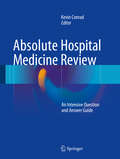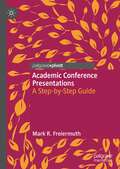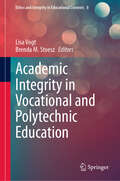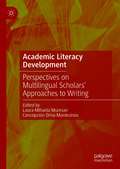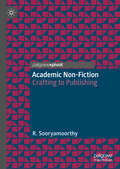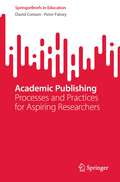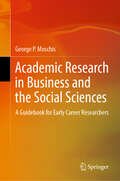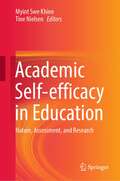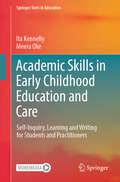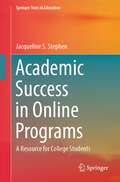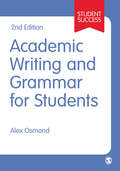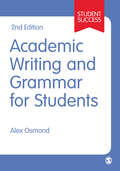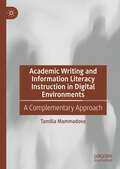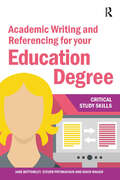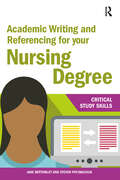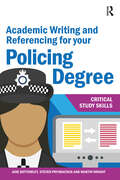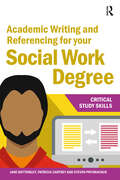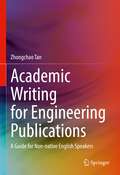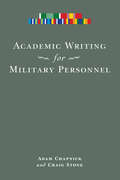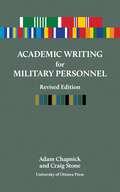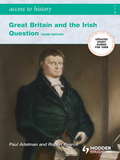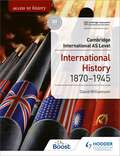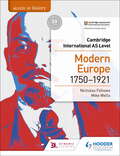- Table View
- List View
Absolute Hospital Medicine Review: An Intensive Question & Answer Guide
by Kevin ConradHospital medicine has expanded beyond the practice of internal medicine to co-manage patients in the fields of orthopedics, neurosurgery and general surgery. This concise guide covers the evolution and expanding scope of hospital medicine and the variety of clinical, ethical and administrative situations a Hospitalist encounters. 500 questions on inpatient care, co-management of patients and hospital system management are provided with the goal of assessing clinical and academic competency. Questions feature actual cases with evidence-based solutions. Useful to physicians, house staff and advanced nurse practitioners, this up-to-date referenced learning text encompasses all aspects of hospital care.
Academic Conference Presentations: A Step-by-Step Guide
by Mark R. FreiermuthThis book provides a step-by-step journey to giving a successful academic conference presentation, taking readers through all of the potential steps along the way—from the initial idea and the abstract submission all the way up to the presentation itself. Drawing on the author's own experiences, the book highlights good and bad practices while explaining each introduced feature in a very accessible style. It provides tips on a wide range of issues such as writing up an abstract, choosing the right conference, negotiating group presentations, giving a poster presentation, what to include in a good presentation, conference proceedings and presenting at virtual or hybrid events. This book will be of particular interest to graduate students, early-career researchers and non-native speakers of English, as well as students and scholars who are interested in English for Academic Purposes, Applied Linguistics, Communication Studies and generally speaking, most of the Social Sciences. With that said, because of the book’s theme, many of the principles included within will appeal to broad spectrum of academic disciplines.
Academic Integrity in Vocational and Polytechnic Education (Ethics and Integrity in Educational Contexts #8)
by Brenda M. Stoesz Lisa VogtAcademic Integrity in Vocational and Polytechnic Education addresses educative approaches to support academic integrity in hands-on and applied learning environments with a focus on practitioner experiences. Building on systems theory, the book documents multi-stakeholder perspectives of institutional leaders, department specialists, and individual champions of academic integrity. Readers will be introduced to the 4M framework, which views academic integrity as a responsibility at all levels of the institution and connects to the broader community and professional industries. Each chapter is set in an applied context and lends to the philosophy of a shared responsibility in growing the institutional culture of academic integrity. This book offers insights from the perspectives of leaders, faculty, and support staff, as authors describe challenges and solutions to upholding academic integrity in short term programming geared toward employment readiness. Although the work is about vocational and polytechnic education written by members of this community, it has a wider appeal across higher education due to shifting pedagogical methods that are becoming more applied and personalized. In an age of information ubiquity, where traditional learning activities such as rote memorization and essay writing do not sufficiently assess learning or prepare the learner for the workplace, educators will find unique insights from the vocational and polytechnic sector to supporting academic integrity in a changing academic landscape.
Academic Literacy Development: Perspectives on Multilingual Scholars' Approaches to Writing
by Laura-Mihaela Muresan Concepción Orna-MontesinosThis edited book brings together an international cast of contributors to examine how academic literacy is learned and mastered in different tertiary education settings around the world. Bringing to the fore the value of qualitative enquiry through ethnographic methods, the authors illustrate in-depth descriptions of genre knowledge and academic literacy development in first and second language writing. All of the data presented in the chapters are original, as well as innovative in the field in terms of content and scope, and thought-provoking regarding theoretical, methodological and educational approaches. The contributions are also representative of both novice and advanced academic writing experiences, providing further insights into different stages of academic literacy development throughout the career-span of a researcher. Set against the backdrop of internationalisation trends in Higher Education and the pressure on multilingual academics to publish their research outcomes in English, this volume will be of use to academics and practitioners interested in the fields of Languages for Academic Purposes, Applied Linguistics, Literacy Skills, Genre Analysis and Acquisition and Language Education.
Academic Non-Fiction: Crafting to Publishing
by R. SooryamoorthyThis book offers comprehensive directions to crafting academic nonfiction that is both rigorous and captivating, filling a critical gap in the genre. While academic nonfiction plays a vital role in fostering knowledge-based societies and driving economic growth, there has long been a need for a resource that helps authors create works that are as engaging as they are informative. Designed for both aspiring and established writers, this book provides practical advice and innovative techniques to elevate nonfiction writing. It covers everything from selecting marketable topics and developing effective writing habits to managing time and navigating the complexities of the publication process. Unlike most writing guides, it emphasises how to infuse nonfiction with the allure and engagement necessary to reach a broad audience without compromising accuracy or depth. With short, digestible chapters, insider tips on proposal writing, and insights into the peer review process, this book serves as a step-by-step roadmap to transforming academic writing into compelling works. Essential for writers aiming to produce nonfiction that not only informs but also resonates with readers, this resource is an indispensable tool for creating impactful scholarly work.
Academic Publishing: Processes and Practices for Aspiring Researchers (SpringerBriefs in Education)
by David Coniam Peter FalveyThis book focuses on the topic of academic publishing. It discusses the mounting, serious problems that researchers, particularly new researchers, encounter when trying to publish their research. The book addresses the issues of publishing as well as the salient factors militating against academic publication and the mitigating factors encouraging academic publication. It provides potential solutions, suggestions, and strategies for overcoming some of these problems. Growing research output from Southeast Asia including Singapore, Malaysia, Taiwan, and China reveals the struggles that many authors have to confront when attempting to publish their work in reputable journals. In both South Africa and other parts of Africa, academic researchers are beginning to show strong evidence of credible academic output. These researchers all need valid outlets for their work and the security that authentic peer review brings to the reviewing process. In the fields of education, social sciences, and professional practices, e.g., architecture and law, recent years have seen the emergence of new outlets for practitioners’ research outputs in areas such as one’s own practice, self-reflection, and narrative inquiry. These outlets are discussed in this book. The book also discusses the malign influence of predatory publications in detail. This book will be beneficial to university academics, postgraduate students, Ph.D. supervisors, and new researchers.
Academic Research in Business and the Social Sciences: A Guidebook for Early Career Researchers
by George P. MoschisThis book provides doctoral students, junior faculty and early-career researchers with guidelines, resources and strategies for performing and publishing academic research successfully. It helps increase the productivity of researchers by showing efficient and effective ways to increase research output and publication probability, ranging from manuscript preparation and positioning to working with co-authors and journal reviewers. The author uses research findings, anecdotal evidence and illustrations from his academic career to support his views on strategies and tactics that are required of scholars in order to succeed.
Academic Self-efficacy in Education: Nature, Assessment, and Research
by Myint Swe Khine Tine NielsenThis book documents systematic, prodigious and multidisciplinary research in the nature and role of academic self-efficacy, and identifies areas for future research directions within the three sections of the book: 'Assessment and Measurement of Academic Self-efficacy', 'Empirical Studies on What Shapes Academic Self-efficacy', and 'Empirical Studies on Influence of Academic Self-efficacy'. The book presents works by educators and researchers in the field from various parts of the world, highlighting advances, creative and unique approaches, and innovative methods. It examines discussions around the theoretical and practical aspects of academic self-efficacy in culturally and linguistically-diverse educational contexts. This book also showcases work based on classical and modern test theory methods, mediation and moderation analysis, multi-level modelling approaches, and qualitative analyses.
Academic Skills in Early Childhood Education and Care: Self-Inquiry, Learning and Writing for Students and Practitioners (Springer Texts in Education)
by Ita Kennelly Meera OkeThis book supports the development of academic, personal, and professional skills for students of Early Childhood Education and Care (ECEC). It aims to demystify aspects of learning and writing practices and can be used by students as a practical resource to enhance their engagement with education and to support their success on their programmes. The book guides students in a range of areas to help their academic development including study techniques, time management, managing groupwork, understanding assessment requirements, academic writing and how to work effectively within a digital learning environment. In addition, the book features a strong personal and professional development dimension which enables readers to engage in a process of self-inquiry as part of their learning. This self-inquiry is important to understanding assumptions about learning and can help students to explore their prior educational experiences and to identify their particular motivations and challenges. The book extends this self-inquiry to support the development of reflective practice which is key to enhancing students' learning and to enabling the ongoing professional development and practice of the ECEC educator. While many ECEC undergraduate programmes offer academic guidance to students, there is a gap for a more embedded academic support which is discipline specific and therefore more closely attuned to the needs of the ECEC student and the emerging needs of the sector. In addition to providing a resource for students and practitioners, this book can also serve as a useful resource for lecturers in the ECEC discipline. Its accompanying site contains downloadable templates from the book which provide a range of activities and prompts suitable for engaging students in thinking about their learning and writing about their professional practice.
Academic Success in Online Programs: A Resource for College Students (Springer Texts in Education)
by Jacqueline S. StephenThis book provides higher education students with a comprehensive resource to assist them in their academic persistence in an online course or program. It addresses a wide selection of topics emphasizing a myriad of factors that impact a student’s persistence, and ultimate success, in an online program or course. The book helps students to gain insight into the skills, knowledge, and attributes needed to succeed in the autonomous nature of an online learning environment. Thus, this book helps students to proactively engage in activities to prepare for online learning. Information presented in each chapter is drawn from theory and recent research centered on persistence of online students in higher education. It incorporates hands-on practical activities to promote application of theory and research, and encourages students to demonstrate their knowledge, skills, and abilities through the use of reflective and thought-provoking activities. Hence, this book provides online students with an up-to-date resource they can use to develop an awareness of their readiness and preparedness for online learning. Additionally, this book equips students with information and strategies aimed at helping them to address gaps in their skills and knowledge that may present them with barriers to academic success. The content of this book is aligned with widely used student learning outcomes and objectives of first-year student seminar courses and orientation programs for graduate and undergraduate students enrolled in online programs. Furthermore, it is deliberately organized and structured to support an online student’s academic journey as they navigate the online learning environment. As such, these features make it an ideal book for use by students, instructors, and academic advisors or college and university academic support staff.
Academic Writing and Grammar for Students (SAGE Study Skills Series)
by Alex OsmondAvailable as an E-Inspection Copy! Go here to order Grappling with grammar? Struggling with punctuation? Whether you're writing an essay or assignment, report or dissertation, this useful guide shows you how to improve the quality of your work at university – fast – by identifying and using the correct use of English grammar and punctuation in your academic writing. Using tried and tested advice from student workshops, Alex Osmond shares practical examples that illustrate common mistakes, and shows you how to avoid them. You’ll also discover guidance on: Writing structure – the what and how of crafting sentences and paragraphs Conciseness – how to express your point succinctly and clearly, showing you understand the topic Effective proofreading – the importance of the final ‘tidy up’, so your work is ready to hand in Referencing – common systems, and how to reference consistently (and avoid plagiarism). This new edition also includes separate chapters on critical thinking and referencing, exploring each topic in more detail, and learning outcomes in every chapter, so you can identify what new skills you’ll take away. Personal tips and advice direct from Alex Osmond For access to additional resources and one-to-one advice from Alex, 'like' his Facebook page Academic Writing and Grammar for Students. SAGE Study Skills are essential study guides for students of all levels. From how to write great essays and succeeding at university, to writing your undergraduate dissertation and doing postgraduate research, SAGE Study Skills help you get the best from your time at university. Visit the SAGE Study Skills hub for tips, resources and videos on study success!
Academic Writing and Grammar for Students (SAGE Study Skills Series)
by Alex OsmondThis handy guide shows students how to use academic English grammar and punctuation. The author identifies common grammar mistakes and how to avoid them, making extensive use of examples and advice from tutors from a range of subjects. This valuable book enables readers to immediately improve their work at university.<P> Inside, you will find practical advice on:<P> * common mistakes<P> * punctuation<P> * conciseness<P> * proofreading<P> * referencing<P> * and more.<P> The advice in the book has been tried and tested through workshops that the author runs with students. It will be useful to undergraduates on a wide range of courses, and will help promote independent learning as well as practical writing skills.
Academic Writing and Information Literacy Instruction in Digital Environments: A Complementary Approach
by Tamilla MammadovaThis book offers an interdisciplinary approach to the teaching of academic writing and information literacy in a new digital dimension, drawing on recent trends towards project-based writing, digital writing and multimodal writing in Education, and synthesising theory with practice to provide a handy toolkit for teachers and researchers. The author combines a practical orientation to teaching academic writing and information literacy with a grounding in current theories of writing instruction in the digitalized era, and argue that as digital environments become more universal in modern society - particularly in the aftermath of the coronavirus pandemic - the lines between traditional academic writing and multi-modal digital writing must necessary become blurred. This book will be of use to teachers and instructors of academic writing and information literacy, particularly within the context of English for Academic Purposes (EAP), as well as students and researchers in Applied Linguistics, Pedagogy and Digital Writing.
Academic Writing and Referencing for your Education Degree (Critical Study Skills)
by David Waugh Jane Bottomley Steven PryjmachukIf you are embarking on a university-based education degree, including initial teacher training, the books in this series will help you acquire and develop the knowledge, skills and strategies you need to achieve your goals. They provide support in all areas important for university study, including institutional and disciplinary policy and practice, self-management, and research and communication. Tasks and activities are designed to foster aspects of learning which are valued in higher education, including learner autonomy and critical thinking, and to guide you towards reflective practice in your study and work life.Academic Writing and Referencing for your Education Degree provides you with a sound knowledge and understanding of: what constitutes good academic writing in education a range of strategies for writing successful essays and reports the importance of clarity and coherence in your writing about education how to improve your academic style, grammar and punctuation, and formatting and presentation referencing conventions in the field of education, and of how to avoid plagiarism.
Academic Writing and Referencing for your Nursing Degree (Critical Study Skills)
by Jane Bottomley Steven PryjmachukInvaluable jargon-free guide for anyone doing a nursing degree, providing study support and helping you to improve your academic writing and referencing skills.Academic Writing and Referencing for your Nursing Degree provides you with a sound knowledge and understanding of: what constitutes good academic writing in nursing a range of strategies for writing successful essays and reports the importance of clarity and coherence in your writing about nursing how to improve your academic style, grammar and punctuation, and formatting and presentation referencing conventions in the field of nursing, and of how to avoid plagiarism. If you are embarking on a university nursing degree, the books in our Critical Study Skills for Nursing series will help you acquire and develop the knowledge, skills and strategies you need to achieve your goals. They provide support in all areas important for university study, including institutional and disciplinary policy and practice, self-management, and research and communication. Tasks and activities are designed to foster aspects of learning which are valued in higher education, including learner autonomy and critical thinking, and to guide you towards reflective practice in your study and work life.
Academic Writing and Referencing for your Policing Degree (Critical Study Skills)
by Martin Wright Jane Bottomley Steven PryjmachukIf you are embarking on a university criminology, policing or other law enforcement professional degree, the books in this series will help you acquire and develop the knowledge, skills and strategies you need to achieve your goals. They provide support in all areas important for university study, including institutional and disciplinary policy and practice, self-management, and research and communication. Tasks and activities are designed to foster aspects of learning which are valued in higher education, including learner autonomy and critical thinking, and to guide you towards reflective practice in your study and work life.Academic Writing and Referencing for your Policing Degree provides you with a sound knowledge and understanding of: what constitutes good academic writing in policing a range of strategies for writing successful essays and reports the importance of clarity and coherence in your writing about policing how to improve your academic style, grammar and punctuation, and formatting and presentation referencing conventions in the field of policing, and of how to avoid plagiarism.
Academic Writing and Referencing for your Social Work Degree (Critical Study Skills)
by Jane Bottomley Steven Pryjmachuk Patricia CartneyIf you are embarking on a university social work degree the books in this series will help you acquire and develop the knowledge, skills and strategies you need to achieve your goals. They provide support in all areas important for university study, including institutional and disciplinary policy and practice, self-management, and research and communication. Tasks and activities are designed to foster aspects of learning which are valued in higher education, including learner autonomy and critical thinking, and to guide you towards reflective practice in your study and work life.Academic Writing and Referencing for your Social Work Degree provides you with a sound knowledge and understanding of: what constitutes good academic writing in social work a range of strategies for writing successful essays and reports the importance of clarity and coherence in your writing about education how to improve your academic style, grammar and punctuation, and formatting and presentation referencing conventions in the field of social work, and of how to avoid plagiarism.
Academic Writing for Engineering Publications: A Guide for Non-native English Speakers
by Zhongchao TanThis textbook is designed for non-native English speakers who need to write scientific and engineering research articles, technical reports, engineering thesis, academic books, and other technical documents in English. The author focuses on formal academic writing in a professional language and frame. The book is written in standard English and provides useful guidelines on development of thoughts, organization of ideas, construction of paragraphs and sentences, and choices of precise words. It also pays attention to details such as visual creation, punctuation, and format. Informal writing is excluded from the scope of this practical guideline.
Academic Writing for Military Personnel
by Adam Chapnick Craig StoneAcademic Writing for Military Personnel is written for members of the military who are either new to or re-entering the academic community and who need to familiarize themselves with academic writing. The authors, an experienced writing instructor and a retired military officer, show how persuasive academic writing enhances officers’ effectiveness in their regular duties, especially as they reach more senior levels of service. They explain the differences between staff writing and academic writing, and outline some of the common errors military personnel make when transitioning from one to the other. The book’s chapters outline the value of strong written communication skills, the research process, the writing process, academic referencing, and frequent grammatical and syntactical errors. Specific examples chosen with a military audience in mind are integrated throughout the book to provide the reader with relevant and practical guidance. The book concludes with a discussion on how officers can use the knowledge they have acquired through their professional experiences in their academic work. As the only comprehensive guide to effective academic writing designed specifically for military personnel, this book will be a crucial addition to the libraries of junior and senior officers in militaries worldwide.
Academic Writing for Military Personnel, revised edition: Revised Edition (Standalone titles)
by Adam Chapnick Craig StoneAcademic Writing: A Guide for Military Personnel est un manuel de rédaction conçu pour aider le personnel militaire à rédiger des travaux savants dans un style clair et efficace. Fruit de la collaboration entre un professeur d’écriture chevronné et un officier militaire à la retraite, le manuel s’adresse aux membres des forces armées qui rejoignent le monde universitaire et qui ont déjà rédigé dans un contexte professionnel militaire ou qui n’ont aucune expérience de la rédaction. En plus d’enseigner aux officiers comment rédiger efficacement, cet ouvrage explique en quoi la maîtrise des techniques de rédaction est utile au personnel des forces armées dans leurs tâches régulières, en particulier aux échelons supérieurs. L’ouvrage traite de l’importance de savoir communiquer par écrit, de ce qui distingue la rédaction savante de la rédaction professionnelle, des processus de recherche et de rédaction proprement dite, du professionnalisme dans la sphère universitaire ainsi que des problèmes et défis fréquemment rencontrés par les rédactrices et les rédacteurs. Un dernier chapitre novateur traite de la manière dont les officiers peuvent mettre à profit les connaissances qu’ils ont acquises par leurs expériences professionnelles dans le contexte universitaire. Des exemples concrets — à l’usage particulier des militaires — sont présentés tout au long du texte pour guider la lectrice et le lecteur de manière pratique et pertinente.Cette édition révisée comprend de nouveaux exemples provenant d’une plus grande variété d’auteurs. Elle prend en compte l’évolution récente des technologies de communication et reflète les nouvelles avancées dans les domaines de l’enseignement et de l’apprentissage.Cet ouvrage, qui est le seul guide exhaustif sur la rédaction à l’usage du personnel militaire, est un ajout incontournable à la bibliothèque de tout officier militaire où qu’il se trouve et quel que soit son rang.Ce livre est publié en anglais. Note : Une version française de ce livre sera disponible en 2023.Formats disponibles : couverture souple, PDF accessible et ePub accessible
Access To History: Great Britain and the Irish Question 1798-1921 Third Edition
by Robert Pearce Paul AdelmanThe second edition of this popular title provides both a narrative and analysis of the relationship between Great Britain and Ireland, from its origins and the Act of Union in 1800 to the Anglo Irish settlement in 1922. Important events such as the Great Famine and the Easter Rising are explained, and key figures such as Parnell, Gladstone and O'Connell are assessed. This is an essential text for students studying this period to aid understanding of the complex but compelling issues that arose in Ireland and Britain during this period. Throughout the book, key dates, terms and issues are highlighted, and historical interpretations of key debates are outlined. Summary diagrams are included to consolidate knowledge and understanding of the period, and exam style questions and tips for each examination board provide the opportunity to develop exam skills.
Access to History for Cambridge International AS Level: International History 1870-1945
by Alan Farmer David WilliamsonThis title is endorsed by Cambridge Assessment International Education to support the International History 1870-1945 Option from the Cambridge AS History syllabus for first examination from 2021. Develop knowledge and analytical skills with engaging comprehensive coverage of the International History 1870-1945 Option from the Cambridge AS History syllabus for first examination from 2021. - Trust in the clear and authoritative content written by topic experts- Develop source skills through questions on a wide range of sources- Stay focused on the key issues you need to understand with questions throughout each chapter - Improve study and understanding through detailed chapter summary diagrams- Build confidence with applying your knowledge through exam guidance and exam-style questions
Access to History for Cambridge International AS Level: International History 1870-1945
by David WilliamsonThis title is endorsed by Cambridge Assessment International Education to support the International History 1870-1945 Option from the Cambridge AS History syllabus for first examination from 2021. Develop knowledge and analytical skills with engaging comprehensive coverage of the International History 1870-1945 Option from the Cambridge AS History syllabus for first examination from 2021. - Trust in the clear and authoritative content written by topic experts- Develop source skills through questions on a wide range of sources- Stay focused on the key issues you need to understand with questions throughout each chapter - Improve study and understanding through detailed chapter summary diagrams- Build confidence with applying your knowledge through exam guidance and exam-style questionsAlso available in the seriesInternational History 1870-1945Student eTextbook 9781510448902 Modern Europe 1750-1921Student Book 9781510448698 Student eTextbook 9781510448841 The History of the USA 1820-1941Student Book 9781510448681 Student eTextbook 9781510448872
Access to History for Cambridge International AS Level: Modern Europe 1750-1921
by Nicholas Fellows Mike WellsThis title is endorsed by Cambridge Assessment International Education to support the Modern Europe 1750-1921 Option from the Cambridge AS History syllabus for first examination from 2021.Develop knowledge and analytical skills with engaging comprehensive coverage of the Modern Europe 1750-1921 Option from the Cambridge AS History syllabus for first examination from 2021. - Trust in the clear and authoritative content written by topic experts- Develop source skills through questions on a wide range of sources- Stay focused on the key issues you need to understand with questions throughout each chapter - Improve study and understanding through detailed chapter summary diagrams- Build confidence with applying your knowledge through exam guidance and exam-style questionsAlso available in the seriesModern Europe 1750-1921Student eTextbook 9781510448841 International History 1870-1945Student Book 9781510448674 Student eTextbook 9781510448902 The History of the USA 1820-1941Student Book 9781510448681 Student eTextbook 9781510448872
Access to History for Cambridge International AS Level: Modern Europe 1750-1921
by Nicholas Fellows Mike WellsThis title is endorsed by Cambridge Assessment International Education to support the Modern Europe 1750-1921 Option from the Cambridge AS History syllabus for first examination from 2021.Develop knowledge and analytical skills with engaging comprehensive coverage of the Modern Europe 1750-1921 Option from the Cambridge AS History syllabus for first examination from 2021. - Trust in the clear and authoritative content written by topic experts- Develop source skills through questions on a wide range of sources- Stay focused on the key issues you need to understand with questions throughout each chapter - Improve study and understanding through detailed chapter summary diagrams- Build confidence with applying your knowledge through exam guidance and exam-style questionsAlso available in the seriesModern Europe 1750-1921Student eTextbook 9781510448841 International History 1870-1945Student Book 9781510448674 Student eTextbook 9781510448902 The History of the USA 1820-1941Student Book 9781510448681 Student eTextbook 9781510448872
